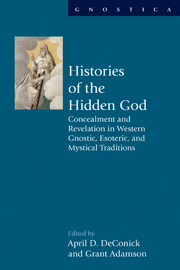 Histories of the Hidden God
Histories of the Hidden God from Part II - The Human Quest for the Hidden God
This essay is part of a series of studies tracing central themes in the history of modern Kabbalah. While classical Jewish studies have generally focused on late antiquity and the Middle Ages, currently one can discern a shift towards a far greater concern with the modern period, in which most of the Kabbalistic literature that has reached us was actually composed. Furthermore, rather than being a residual and soon-to-disappear relic, as in Gershom Scholem's secular-Zionist narrative, Kabbalah is increasingly being portrayed as a vibrant stream within the very process of modernization. As we shall see, adopting this new perspective requires abandoning the meta-narrative of modernity as secularization, and joining the growing body of work known as post-secular. The apparent history of modern Kabbalah is certainly more readily accessible than its nebulous origins, due to developments such as the print revolution and the current rapid digitization of Jewish books. However, following the guiding premise of this volume and the conference upon which it is based, I shall address here its hidden history, whose very existence may not be obvious to all scholars of this lore. This term has three meanings. First, I believe that I have exposed a subterranean current, as it were, which runs below the stream of modern Kabbalistic transmission. The very exposure of the secret is indebted to its partial disclosure in contemporary Kabbalistic writing, as part of the more general process of the exotericization of Kabbalah during the last and current centuries. From here we shall follow the textual record almost exclusively.
To save this book to your Kindle, first ensure [email protected] is added to your Approved Personal Document E-mail List under your Personal Document Settings on the Manage Your Content and Devices page of your Amazon account. Then enter the ‘name’ part of your Kindle email address below. Find out more about saving to your Kindle.
Note you can select to save to either the @free.kindle.com or @kindle.com variations. ‘@free.kindle.com’ emails are free but can only be saved to your device when it is connected to wi-fi. ‘@kindle.com’ emails can be delivered even when you are not connected to wi-fi, but note that service fees apply.
Find out more about the Kindle Personal Document Service.
To save content items to your account, please confirm that you agree to abide by our usage policies. If this is the first time you use this feature, you will be asked to authorise Cambridge Core to connect with your account. Find out more about saving content to Dropbox.
To save content items to your account, please confirm that you agree to abide by our usage policies. If this is the first time you use this feature, you will be asked to authorise Cambridge Core to connect with your account. Find out more about saving content to Google Drive.